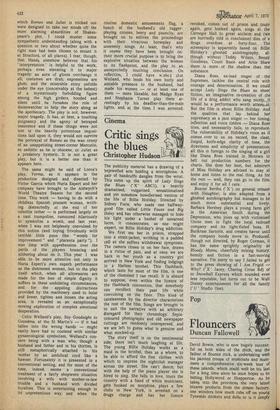Cinema
Critic sings the blues
Christopher Hudson
The publicity material has a drawing of a bejewelled arm holding a microphone. A pair of handcuffs dangles from the wrist. This sums up the spirit of Lady Sings the Blues (' X ' ABC!), a heavily dramatised, vulgarised, sensationalised and yet somehow bowdlerised version of the life of Billie Holiday. Directed by Sidney Furie, who made one halfwaygood film called Little Fauss and Big Halsy and has otherwise managed to hide his light under a bushel of unearned lucre, it concentrates, as one might expect, on Billie Holiday's drug addiction.
We first see her in prison, strapped into a strait-jacket, writhing in a padded cell as she suffers withdrawal symptoms. The camera closes in on her face, drawn in a rictus of pain, and at once we are back in her youth as a country girl arrived in New York and finding lodgings in a Harlem brothel. This flashback, which lasts for most of the film, is one of the clumsiest I can recall. It is absurd to suppose, even within the licence of the flashback convention, that somebody can recollect their past life while convulsing on the floor. This kind of carelessness by the director characterises the rest of the film. Songs are brought in to suit the narrative with an arbitrary disregard for their chronology. Sepiacoloured photographs and old newspaper cuttings are randomly interspersed, and we are left to guess what is genuine and what mocked-up.
The story itself is on the sentimental side; there isn't much laughing at life. The young Billie Holiday works as a maid in the brothel, then as a whore, to be able to afford the fine clothes with which to impress the nightclub manager across the street. She can't dance; but with the help of the piano player she is hired to sing. She falls in love, tours the country with a band of white musicians, gets hooked on morphine, plays a few clubs in New York, is arrested on a drugs charge and has her licence revoked, comes out of prison and tours again, gets hooked again, sings at the Carnegie Hall to great acclaim and (we are hurriedly told in conclusion) dies of a drugs overdose at forty-four. The screenplay is apparently based on Billie Holiday's ghosted autobiography, although without Teddy Wilson, Benny Goodman, Count Basie and Artie Shaw there is more of the shadow than the substance.
Diana Ross, ex-lead singer of the Supremes, tackles the central role with courage and determination. If we could accept Lady Sings the Blues as sheer fiction, an imaginative re-creation of the life of a drug addict who sang nicely, it would be a performance worth attent,J11. But the film is about Billie Holiday. And the qualities that lay behind her supremacy as a jazz singer — her timing, inflection and voice timbre — Diana Ross tries, and necessarily fails, to reproduce. The vulnerability of Holiday's voice as it comes over to us on record, the clear, limpid, knife-edge clarity of tone, the directness and simplicity of presentation; all this is foreign to the singing of a girl like Diana Ross trained in Motown to belt out production numbers for the charts. She d,oes her best, but admirers of Miss Holiday are advised to stay at home and listen to the real thing. AS for the rest — well, they can go to the film, and enjoy it for all I care.
Boxcar Bertha (' X ') on general release with Slaughter, is also adapted from a ghosted autobiography but manages to be much more substantial and lively. Barbara Hershey plays a young farm girl in the American South during the Depression, who joins up with victimised Union men to fight the local railroad company and its tight-fisted boss, H. Buckram Sartoris, and creates havoc until the company hoods move in. Produced, though not directed, by Roger Corman, it has the same sprightly originality as Bloody Mama, cheerfully mixing history, homily and fiction in a fast-moving narrative. I'm sorry to say I failed to get
to the press showing of I Am Frigid — Why? (' X ' Jacey, Charing Cross Rd) or to Snowball Express which sounded even less reputable, but turns out to be Walt Disney entertainment for all the family (' U ' Studio One).


































 Previous page
Previous page